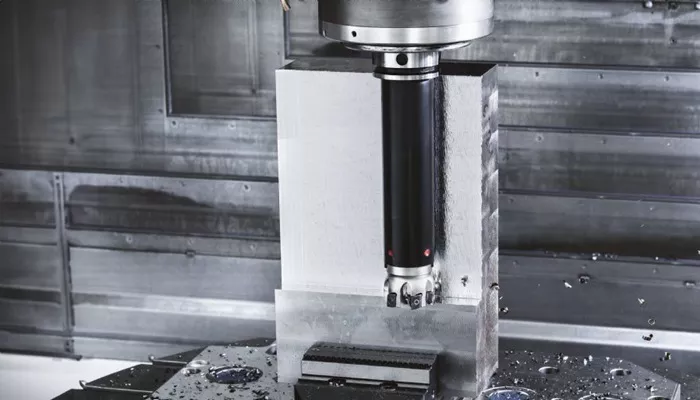Ceratizit has introduced the MaxiMill-Tangent, a new milling cutter with tangential indexable inserts. It is designed to improve durability when machining steel and cast iron parts. At the same time, it allows for stable and gentle cutting.
This improved performance comes from Ceratizit’s focus on creating a uniform chamfer along the entire cutting edge of the precision-ground inserts. The MaxiMill-Tangent offers a wide selection of carriers and inserts, all with four usable cutting edges. These come in two sizes, -09 and -13, to suit different applications.
The inserts are specially optimized for machining ISO P (steel) and ISO K (cast iron) materials. The smaller -09 insert supports a maximum infeed depth of 8 mm, while the larger -13 model allows up to 12 mm. The tool also offers two chip groove options, -M50 and -F50, which help improve chip flow. A smaller radial clearance angle further increases the stability of the cutting edge.
The cutter includes an integrated face-cutting edge. This feature removes material evenly, which results in a smoother surface on the finished part. It also distributes cutting forces more evenly, reducing the load on both the tool and the machine.
Ceratizit provides the MaxiMill-Tangent in three types of carriers: a shell-type milling cutter, a screw-in milling cutter, and a straight shank model. The diameters range from 25 mm to 125 mm.
Tangential Clamping Offers Advantages
Robert Frei, product manager at Ceratizit, explained that tangential clamping offers several benefits over radial clamping. It allows the milling cutter to hold more indexable inserts. This increases the number of cutting edges and improves efficiency.
Mr. Frei added that inserts can be rotated, flipped, or replaced quickly during tool changes. This helps maintain high efficiency without downtime.
He also noted that the MaxiMill-Tangent’s stable design, combined with high-performance four-edged inserts and tangential clamping, makes it easier and more cost-effective to machine parts with complex shapes.
Performance Compared to Conventional Milling Systems
Mr. Frei shared a comparison between the MaxiMill-Tangent and a traditional corner and face milling cutter. In machining a GGG-50 spheroidal graphite cast iron turbocharger component, the MaxiMill-Tangent used a 63 mm diameter cutter with six cutting edges, a 2 mm infeed depth, and a 35 mm insert width. It produced 27 parts before needing replacement, while the competitor’s cutter only made 12 parts.
The key to this success is the cutter’s excellent chip control during shoulder, corner, and face milling. This comes from the cutter’s design and cooling channels. These features prevent chip jams, improve surface finish, and extend tool life.

